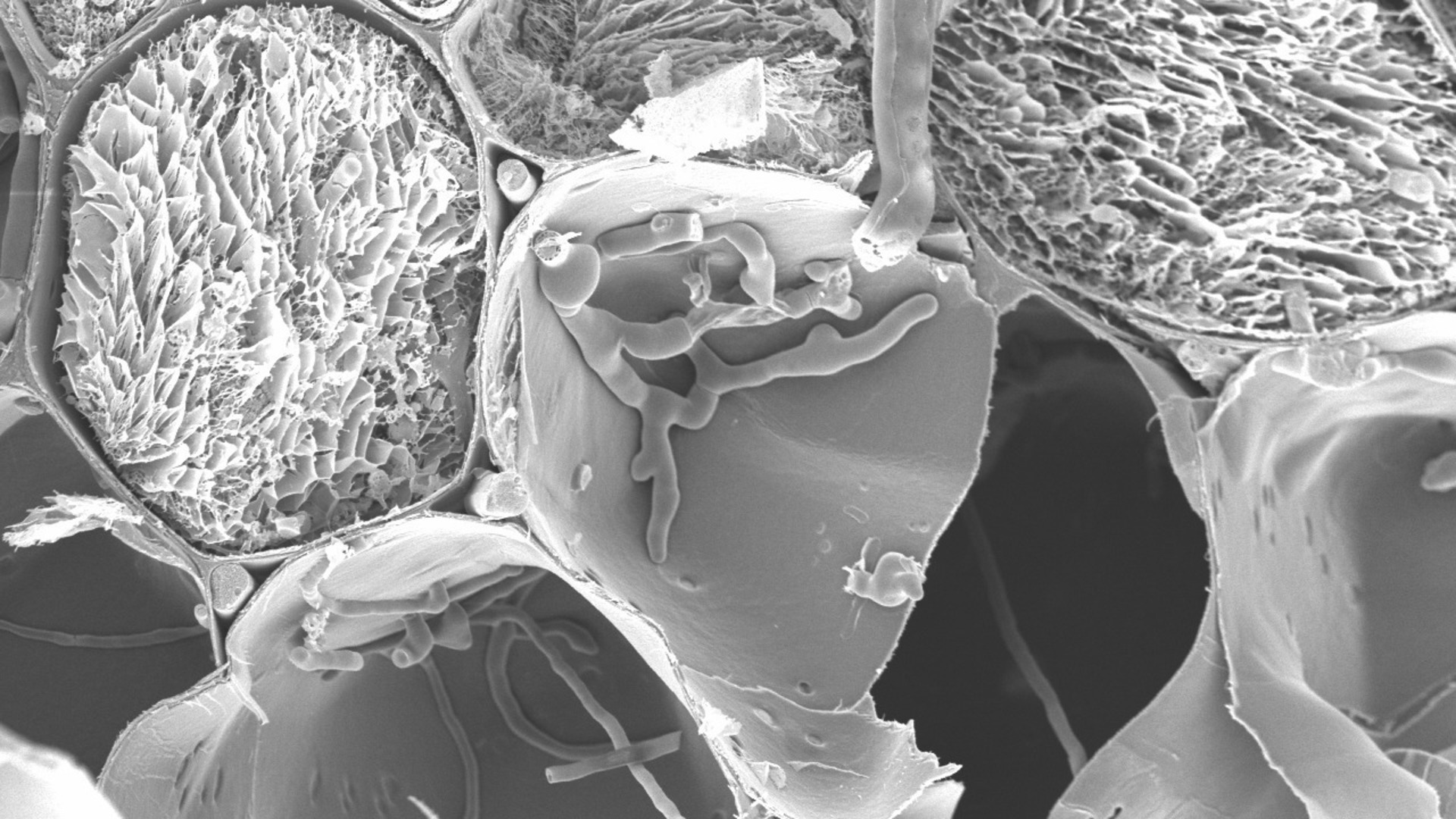The big picture: using wildflower strips for pest control
Researchers investigating the globally important fungal pathogen Fusarium graminearum, the primary cause of Fusarium Head Blight disease in small-grain cereals, have discovered that the mycotoxin deoxynivalenol (DON) plays a crucial role in spreading the infection. DON, which is notorious for contaminating wheat grain and posing risks to food and animal feed safety, facilitates the fungus’s ability to move through plant cell walls via microscopic channels called plasmodesmata.
Using advanced bioimaging techniques, the study found that DON enables the pathogen to traverse these cellular gateways, a process essential for widespread colonisation. When the research team deleted a specific gene (TRI5) which encodes an enzyme that is responsible for a key step in DON production, the fungal spread was significantly restricted, limiting infection to the initially infected spikelet. Attempts to restore the fungus’s aggressive spread by externally supplying DON failed, suggesting that the toxin’s secretion is tightly regulated within the plant and may target plasmodesmata directly.

Further analysis showed that while the infection did not alter the thickness of plant cell walls, it did impact the deposition of callose, a carbohydrate that blocks plasmodesmata and prevents the fungus from passing through. When DON was applied externally, callose deposits increased, but when fungal hyphae were present, these callose deposits were reduced—highlighting the intricate interplay between fungal toxins and plant defences.
“Our research provides new insights into how Fusarium graminearum exploits plant biology to spread within the wheat spike,” said Dr Victoria Armer, who led the study. “This offers potential avenues for developing resistant crop varieties or targeted disease management strategies. With Fusarium Head Blight threatening global wheat production and food safety, understanding these microscopic battles could be key to protecting future harvests.”
The paper was recently awarded best student paper of 2024 in the journal Molecular Plant Pathology.
Dr Armer was supported by the BBSRC-funded South-West Biosciences Doctoral Training Partnership

Molecular Plant Pathologist

Data Scientist

Plant Pathologist
Rothamsted Research is the longest-running agricultural research institute in the world. We work from gene to field with a proud history of ground-breaking
discoveries in areas as diverse as crop management, statistical interpretation and soil health. Our founders, in 1843, were the pioneers of modern
agriculture, and we are known for our imaginative science and our collaborative approach to developing innovative farm practice.
Through independent research, we make significant contributions to improving agri-food systems in the UK and internationally, with
economic impact estimated to exceed £3 bn in annual contribution to the UK economy. Our strength lies in our systems approach, which combines strategic research,
interdisciplinary teams and multiple partnerships.
Rothamsted is home to three unique National Bioscience Research Infrastructures which are open to researchers from all over the world:
The Long-Term Experiments,
Rothamsted Insect Survey and the
North Wyke Farm Platform.
We are strategically funded by the Biotechnology and Biological Sciences Research Council (BBSRC), with additional support from other national and
international funding streams, and from industry. We are also supported by the Lawes Agricultural Trust (LAT).
The Biotechnology and Biological Sciences Research Council is part of UK Research and Innovation, a non-departmental public body funded by a grant-in-aid
from the UK government.
BBSRC invests to push back the frontiers of biology and deliver a healthy, prosperous and sustainable future. Through our investments, we build and support a vibrant,
dynamic and inclusive community which delivers ground-breaking discoveries and develops bio-based solutions that contribute to tackling global challenges,
such as sustainable food production, climate change, and healthy ageing.
As part of UK Research and Innovation (UKRI), we not only play a pivotal role in fostering connections that enable the UK’s world-class research and innovation system
to flourish – we also have a responsibility to enable the creation of a research culture that is diverse, resilient, and engaged.
BBSRC proudly forges interdisciplinary collaborations where excellent bioscience has a fundamental role. We pioneer approaches that enhance the equality, diversity,
and inclusion of talent by investing in people, infrastructure, technologies, and partnerships on a global scale.
The Lawes Agricultural Trust, established in 1889 by Sir John Bennet Lawes, supports Rothamsted Research’s national and international agricultural science through the provision of land, facilities and funding. LAT, a charitable trust, owns the estates at Harpenden and Broom's Barn, including many of the buildings used by Rothamsted Research. LAT provides an annual research grant to the Director, accommodation for nearly 200 people, and support for fellowships for young scientists from developing countries. LAT also makes capital grants to help modernise facilities at Rothamsted, or invests in new buildings.